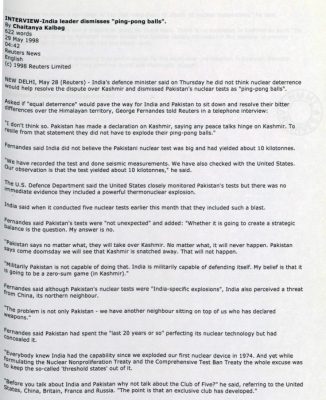Interview- India leader dismisses “ping-pong balls”
[Reuters]
Published date: 29th May 1998
29 May 1998
Reuters News
English
(c) 1998 Reuters Limited
NEW DELHI, May 28 (Reuters) – India’s defence minister said on Thursday he did not think nuclear deterrence would help resolve the dispute over Kashmir and dismissed Pakistan’s nuclear tests as “ping-pong balls”.
Asked if “equal deterrence” would pave the way for India and Pakistan to sit down and resolve their bitter differences over the Himalayan territory, George Fernandes told Reuters in a telephone interview:
“I don’t think so. Pakistan has made a declaration on Kashmir, saying any peace talks hinge on Kashmir. To resile from that statement they did not have to explode their ping-pong balls.”
Fernandes said India did not believe the Pakistani nuclear test was big and had yielded about 10 kilotonnes.
We have recorded the test and done seismic measurements. We have also checked with the United States. Our observation is that the test yielded about 10 kilotonnes,” he said.
The U.S. Defence Department said the United States closely monitored Pakistan’s tests but there was no immediate evidence they included a powerful thermonuclear explosion.
India said when it conducted five nuclear tests earlier this month that they included such a blast.
Fernandes said Pakistan’s tests were “not unexpected” and added: “Whether it is going to create a strategic balance is the question. My answer is no.
Pakistan says no matter what, they will take over Kashmir. No matter what, it will never happen. Pakistan says come doomsday we will see that Kashmir is snatched away. That will not happen.
“Militarily Pakistan is not capable of doing that. India is militarily capable of defending Itself. My belief is that it Is going to be a zero-sum game (in Kashmir).”
Fernandes said although Pakistan’s nuclear tests were “India-specific explosions”, India also perceived a threat from China, its northern neighbour.
“The problem is not only Pakistan – we have another neighbour sitting on top of us who has declared weapons.”
Fernandes said Pakistan had spent the “last 20 years or so” perfecting its nuclear technology but had concealed it.
Everybody knew India had the capability since we exploded our first nuclear device in 1974. And yet while formulating the Nuclear Nonproliferation Treaty and the Comprehensive Test Ban Treaty the whole excuse was to keep the so-called ‘threshold states” out of it.
Before you talk about India and Pakistan why not talk about the Club of Five?” he said, referring to the United States, China, Britain, France and Russia. “The point is that an exclusive club has developed.”
Turning again to Kashmir, Fernandes said Pakistan’s nuclear tests would not make a material difference to the tension across the so-called “line of actual control” that divides the Himalayan territory into the third controlled Dy Islamabad and the two-thirds controlled by New Delhi.
“We have a low-level war going on in Kashmir and it remains at that level. I don’t think this will make a difference.”
Fernandes also said he did not think the heightened tension on the subcontinent would trigger a border Skirmish or mini-war involving conventional weapons.
“Pakistan has let loose a campaign of lies that India plans to attack its nuclear installations,” he said.
“Our belief was that this was a prelude to going for these tests. There is no escalation in Kashmir as such,” he said, adding that firing by Pakistani troops across the frontier usually increased in the summer to provide cover for Moslem guerrillas to slip into the Indian side.
India accuses Pakistan of providing men and materiel for the eight-year-old rebellion in Kashmir. Pakistan denies the charge, saying it only provides moral and diplomatic support.






